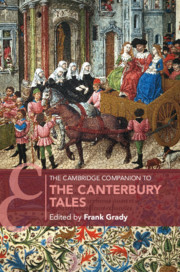Book contents
- The Cambridge Companion to The Canterbury Tales
- The Cambridge Companion to The Canterbury Tales
- Copyright page
- Contents
- Illustrations
- Contributors
- Preface
- Note on the Text
- Chronology
- Abbreviations
- 1 The Form of the Canterbury Tales
- 2 Manuscripts, Scribes, Circulation
- 3 The General Prologue
- 4 The Knight’s Tale and the Estrangements of Form
- 5 The Miller’s Tale and the Art of Solaas
- 6 The Man of Law’s Tale
- 7 The Wife of Bath’s Prologue and Tale
- 8 The Friar’s Tale and TheSummoner’s Tale in Word and Deed
- 9 Griselda and the Problem of the Human in The Clerk’s Tale
- 10 The Franklin’s Symptomatic Sursanure
- 11 The Pardoner and His Tale
- 12 The Prioress’s Tale
- 13 The Nun’s Priest’s Tale
- 14 Moral Chaucer
- 15 Chaucer’s Sense of an Ending
- 16 Postscript: How to Talk about Chaucer with Your Friends and Colleagues
- Further Reading
- Index
- Cambridge Companions to …
9 - Griselda and the Problem of the Human in The Clerk’s Tale
Published online by Cambridge University Press: 21 August 2020
- The Cambridge Companion to The Canterbury Tales
- The Cambridge Companion to The Canterbury Tales
- Copyright page
- Contents
- Illustrations
- Contributors
- Preface
- Note on the Text
- Chronology
- Abbreviations
- 1 The Form of the Canterbury Tales
- 2 Manuscripts, Scribes, Circulation
- 3 The General Prologue
- 4 The Knight’s Tale and the Estrangements of Form
- 5 The Miller’s Tale and the Art of Solaas
- 6 The Man of Law’s Tale
- 7 The Wife of Bath’s Prologue and Tale
- 8 The Friar’s Tale and TheSummoner’s Tale in Word and Deed
- 9 Griselda and the Problem of the Human in The Clerk’s Tale
- 10 The Franklin’s Symptomatic Sursanure
- 11 The Pardoner and His Tale
- 12 The Prioress’s Tale
- 13 The Nun’s Priest’s Tale
- 14 Moral Chaucer
- 15 Chaucer’s Sense of an Ending
- 16 Postscript: How to Talk about Chaucer with Your Friends and Colleagues
- Further Reading
- Index
- Cambridge Companions to …
Summary
Griselda has always challenged the status of the human, even though critics have long sought to elucidate prized human characteristics through her behavior as wife, mother, and political subject. Despite these efforts, our moral investments in Griselda - quite literally, the ways we have sought to associate her with a host of social and moral prescriptions concerning subjectivity, femininity, maternity, and sovereignty - are confounded by her unyielding submission. Griselda is unfeeling, but she gains a horrible autonomy that critiques patriarchal tyranny. Griselda affirms women’s material investment in the household, but to do so she sacrifices all ethical bonds outside those mandated by her pre-marital pact with Walter. Griselda is transcendent, but she is alienated from a common humanity, much less Christianity. This chapter argues that Griselda is not an inhuman monster; rather, through The Clerk’s Tale, Chaucer imagines a different view of humanity, one engendered according to modes of virtue typically associated with women, including patience, pity, humility, steadfastness, and submission.
- Type
- Chapter
- Information
- The Cambridge Companion to The Canterbury Tales , pp. 136 - 150Publisher: Cambridge University PressPrint publication year: 2020
- 3
- Cited by

